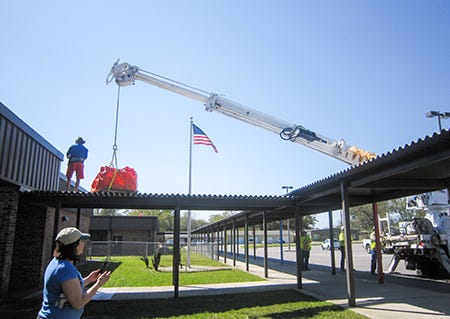
PACE — Northwest Florida may be a perfect vacation spot for snowbirds, but its beaches are becoming less and less desirable for shorebirds that migrate from as far away as South America to nest during the spring and summer.
Increased coastal development, erosion, growing numbers of beachgoers tromping through the sand stepping on eggs and flushing chicks, along with a rise in the numbers of hungry coyotes, raccoons and feral cats, are sending away many of the birds, including least terns, looking for safer grounds.
So they’re taking to the flat roofs of hotels, big box stores and even schools, like S.S. Dixon Primary in Pace, not the best of nesting perches. The tiny chicks fall off and end up stepped on, run over by vehicles, eaten by feral cats and even red ants, Julie Wraithmell, Deputy Executive Director of Audubon Florida, pointed out.
With the help of Rodney Smith, Gulf Power Distribution Construction coordinator, Emily McKiddy, coordinator of the Audubon Florida Rooftop Nesting Program, said her team was able to get more than 600 pounds of bricks and chicken wire lifted onto the roof to chick-proof it.
“Rodney Smith was able to get us a pole truck from a contractor to lift the materials on the roof,” said McKiddy. “He came out to the school with me twice to figure out ways to get the truck on the site and how to get the material on the roof. He was great.”
The project involved installing chick fencing along the 1,100-foot rooftop perimeter of the primary school to keep least tern chicks from falling off once they hatch.
Smith said when McKiddy told him about the project, he and Diversified Services — the contractor for Gulf Power’s overhead line work that’s well-trained and equipped to lift much heavier material — were happy to help.
“Emily told me her team had been doing this rooftop chick-proofing across Gulf Power’s service area, and other utilities and contractors had been helping out,” Smith said. “There was a need, and for the right reason. We had a contractor with the right equipment to meet their needs and do it safely.”
Smith coordinated the workday during a time the Diversified crew was traveling through Pace and didn’t have to go out if their way to do the job.
Wraithmell was grateful Gulf Power stepped in to help her Rooftop team, which has been working in the Panhandle for three years.
“With Gulf Power’s help, a project that would have taken a full day of back-breaking work for our staff and volunteers only took a few hours,” she said. “We are very grateful, and it is just like Gulf Power to help where they see they are needed. The chicks that will hopefully hatch on this roof in a few months have a much brighter future now.”
Gulf Power and its parent Southern Company have a long history partnering with Audubon Florida.
“We have long been a participant at Southern Company’s Power of Flight meetings and hosted a field trip at last year’s annual Stewardship Partner’s meeting in Pensacola,” she said. “Also, our local chapter in Pensacola, Francis M. Weston Audubon, was a previous recipient of two Power of Flight grants that helped support its Gulf Coast Urban Education Initiative.”
This article originally appeared on Santa Rosa Press Gazette: Gulf Power employee helps 'chick-proof' SS Dixon's roof
